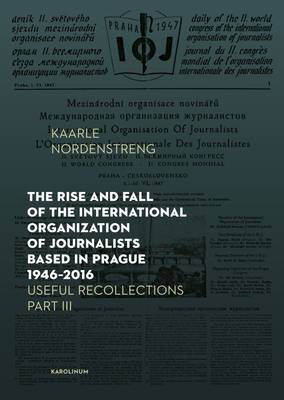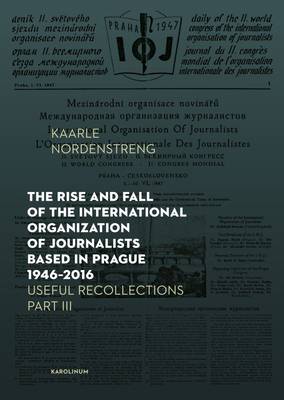
Door een staking bij bpost kan je online bestelling op dit moment iets langer onderweg zijn dan voorzien. Dringend iets nodig? Onze winkels ontvangen jou met open armen!
- Afhalen na 1 uur in een winkel met voorraad
- Gratis thuislevering in België vanaf € 30
- Ruim aanbod met 7 miljoen producten
Door een staking bij bpost kan je online bestelling op dit moment iets langer onderweg zijn dan voorzien. Dringend iets nodig? Onze winkels ontvangen jou met open armen!
- Afhalen na 1 uur in een winkel met voorraad
- Gratis thuislevering in België vanaf € 30
- Ruim aanbod met 7 miljoen producten
Zoeken
The Rise and Fall of the International Organization of Journalists Based in Prague 1946-2016
Useful Recollections Part III
Kaarle Nordenstreng
Paperback | Engels
€ 27,45
+ 54 punten
Omschrijving
In this book, Finnish scholar Kaarle Nordenstreng provides a unique account of the Prague-based International Organization of Journalists, a group that was at one time the world's largest media association. The IOJ expanded from a postwar fraternity of professional journalists in twenty countries to a truly global organization that had its hand in running journalism schools, a publishing house, a conference service, and a number of commercial enterprises in Czechoslovakia. Though the Cold War kept most Western journalists' unions isolated from the organization, the IOJ was a major player in Communist Eastern Europe--at its peak in the late 1980s, the IOJ counted 300,000 journalists as members. Nordenstreng--who served as president of the IOJ for fourteen years--illuminates this exciting and little-explored chapter in the history of postwar Europe, from the rise of the Iron Curtain through the post-Soviet 1990s. He enlivens his firsthand account with personal testimonies from former IOJ members and a wealth of previously unpublished internal documents.
Specificaties
Betrokkenen
- Auteur(s):
- Uitgeverij:
Inhoud
- Aantal bladzijden:
- 540
- Taal:
- Engels
Eigenschappen
- Productcode (EAN):
- 9788024645056
- Verschijningsdatum:
- 15/06/2021
- Uitvoering:
- Paperback
- Formaat:
- Trade paperback (VS)
- Afmetingen:
- 165 mm x 235 mm
- Gewicht:
- 904 g

Alleen bij Standaard Boekhandel
+ 54 punten op je klantenkaart van Standaard Boekhandel
Beoordelingen
We publiceren alleen reviews die voldoen aan de voorwaarden voor reviews. Bekijk onze voorwaarden voor reviews.











